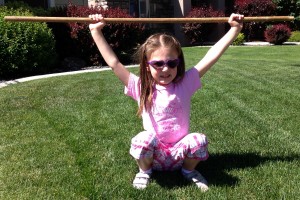Q. My son is 11 years old and wants to start lifting weights with me. Is it safe for him to do this at such a young age? -Matt
A. Great question, Matt! I believe weight training and activity in general should be encouraged in whatever form the child prefers. Research regarding the effects of heavy weight training or high intensity training in younger children continues to evolve. The long standing belief that weight lifting will stunt a child’s growth has never been proven. In fact, current research indicates that weight lifting may actual help to increase a child’s growth rate. This may be due to hormonal improvements or actual physical stress (in response to the training) on the child’s body. Most likely, the positive effect on growth rate is due to a combination of both factors.
When addressing weight training, keep in mind that children’s physical, mental, and emotional development will vary widely and is not necessarily correlated to their chronological age. Most children will have varying degrees of muscle strength and asymmetry in that strength as they grow and develop. Encouraging activity and exercise is a critical component to how the child will ultimately develop. When choosing which type of activity and exercise is appropriate for a child, his/her physical, mental, and emotional development need to be considered.
Physiological considerations include:
- Growth Plates. The epiphyseal plate (growth plate), which is a cartilaginous plate at each end of a long bone, in children typically closes between 18-25 years old. It is most active when the child is younger. There is no evidence that weight lifting will negatively affect the growth plates. The question that research has failed to answer is: How much stress and strain is too much? A child’s boney structure is not the same as that of an adult. Lifting excessively heavy loads with poor technique could cause damage to these growth plates. In order to insure your child’s safety and limit the risk of injury, his/her weight lifting schedule or program should not be the same as that of an adult.
- Muscle Strength. Adolescent muscle development will vary widely. It’s highly dependent on proper hormonal balance. Most children don’t have the proper hormonal balance to develop muscle like an adult. Therefore, a child should not be trained as an adult.
Weight training can be appropriate at a young age. Focus on learning the techniques while developing proper motor patterns and motor control (particularly, if he/she is performing advanced activities such as Olympic weight lifting). Children’s growth and development tends to occur in spurts. They often have evolving issues with muscle tightness and asymmetric muscle development. A weight lifting program that stresses proper movement patterns and full range of motion (ROM) is an excellent method to help insure proper muscle development. Weight lifting is just one of many training activities for a child. I highly encourage children to participate in many different activities in order to develop a wide physiological and neurological baseline.
Consider the following when designing a training program for your child:
- Keep it fun! This is your child’s time to learn and have fun. There is no need to push heavy weights on his/her young body. However, it’s perfectly acceptable to progress strength gains when he/she is able.
- Develop proper motor programs. Focus on optimizing patterns and mobility. A weight lifting program that stresses proper movement patterns and full range of motion (ROM) is an excellent method to help insure proper muscle development.
- Encourage variety. For other strength development and motor program development options, encourage body weight exercises such as the TRX system. A CrossFit class, designed specifically for kids, may also be fun option.
- Proper programming. A child should not be trained as an adult. The exercise programming should be tailored to your child. I recommend an emphasis on technique and a slower progression of resistance and load compared to that of an adult. For young children, double the time it takes for an adult to progress the load. Physical ability will widely vary in the teenage years. Focus on form and technique while developing proper movement patterns. Encourage participation in many different activities in order to develop a wide physiological and neurological baseline. Training volume should be less than an adult.
If your child is experiencing pain or you suspect a developing problem, consult your pediatric physician or a qualified physical therapist about your concerns. I would also caution you that many pediatric physicians may not be too keen on the idea of weight training in pre-teen children. Seek a physician who is open to the idea and can work with you and your child to insure optimal health.
As parents, we want to encourage activity and exercise while instilling a life time love of exercise in all of its many forms. When weight training at a young age, focus on proper ROM and symmetrical strength development. Thanks, Matt, for the question!
Does your child lift weights and/or participate in sports such as CrossFit? Why or why not? Please share your thoughts below.
If you have a question that you would like featured in an upcoming blog post, please comment below or submit your question to contact@thePhysicalTherapyAdvisor.com. Be sure to join our growing community on Facebook by liking The Physical Therapy Advisor!
Disclaimer: The Physical Therapy Advisor blog is for general informational purposes only and does not constitute the practice of medicine or other professional health care services, including the giving of medical advice. No health care provider/patient relationship is formed. The use of information on this blog or materials linked from this blog is at your own risk. The content of this blog is not intended to be a substitute for professional medical advice, diagnosis, or treatment. Do not disregard, or delay in obtaining, medical advice for any medical condition you may have. Please seek the assistance of your health care professionals for any such conditions.

